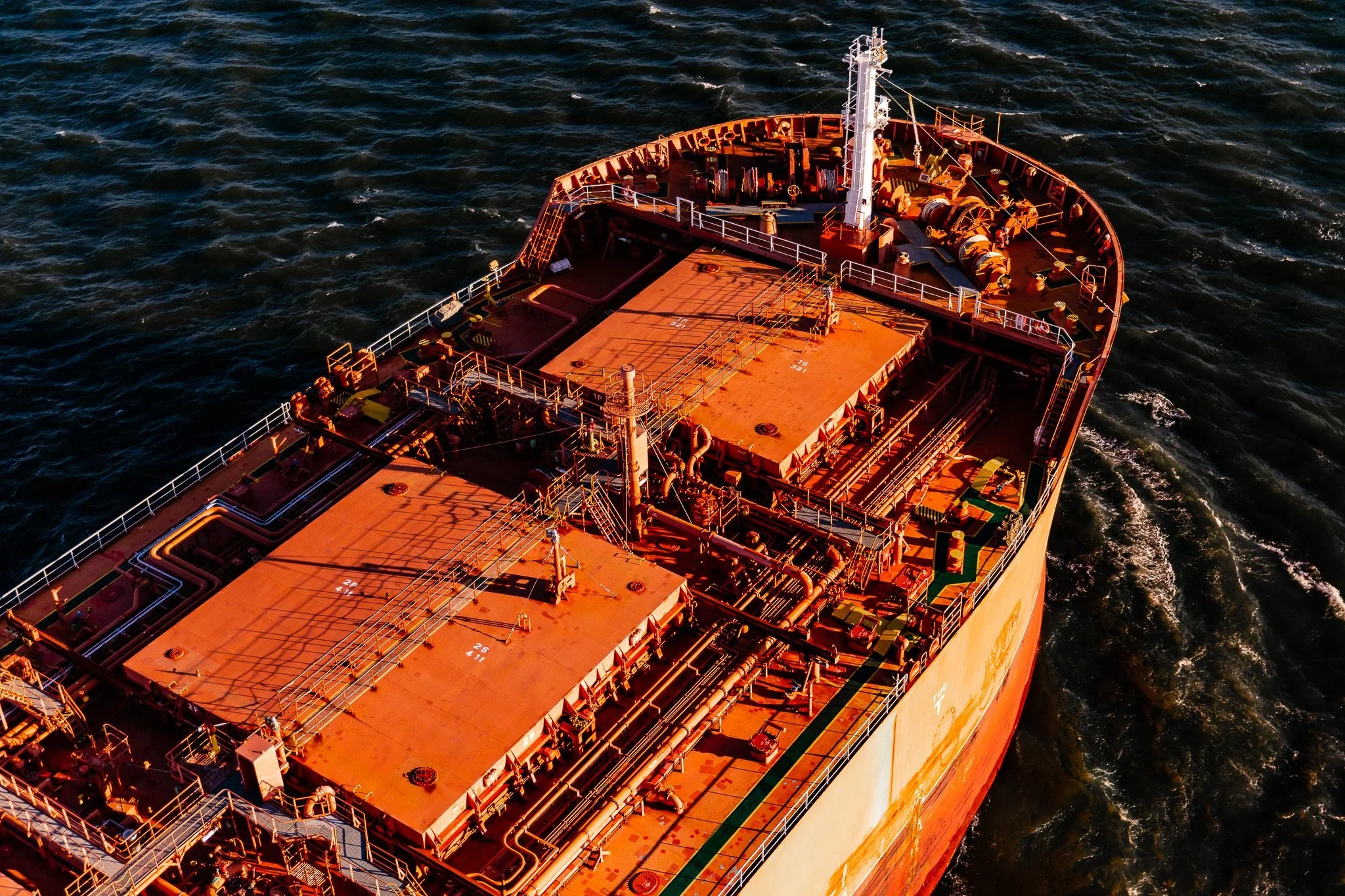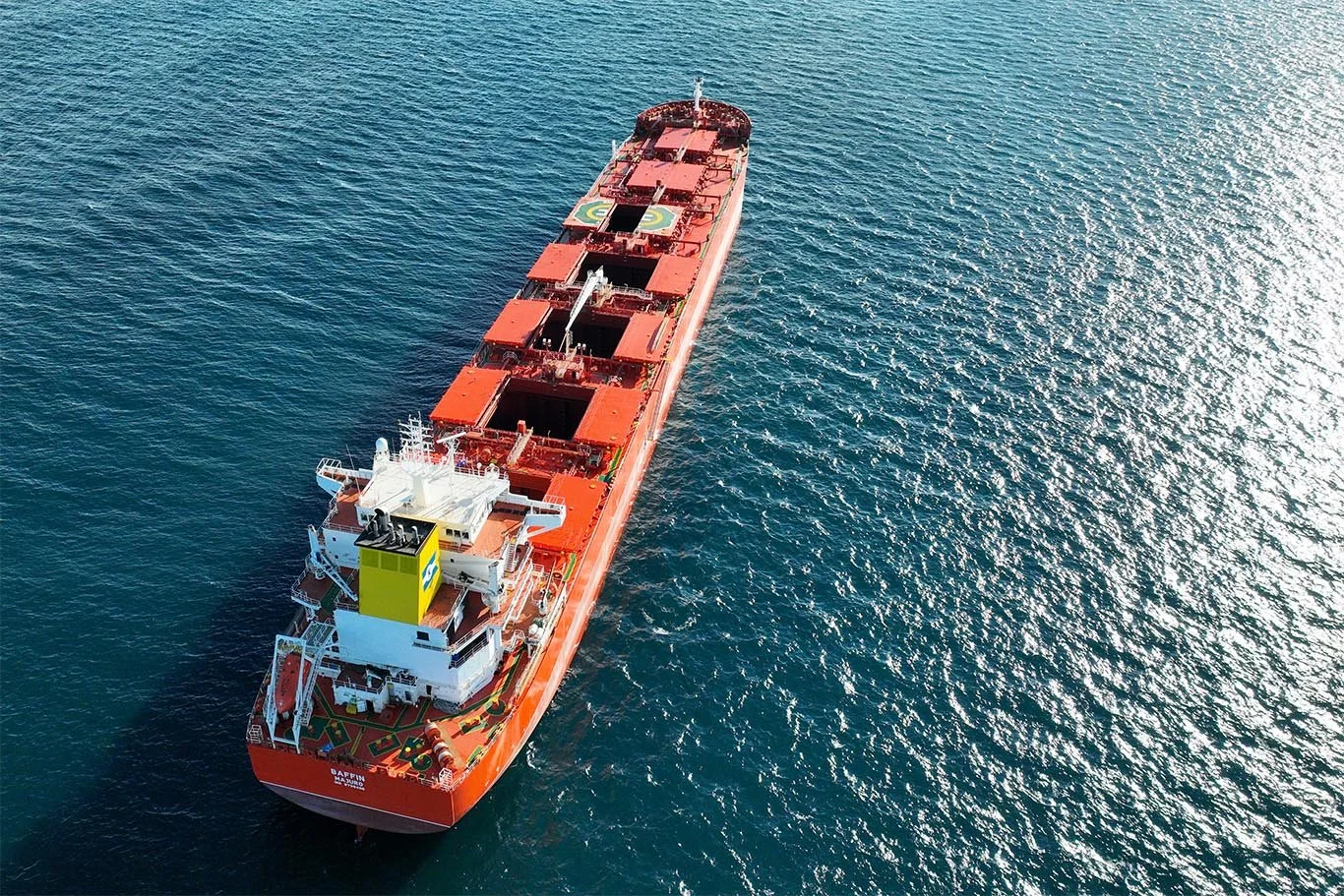
OUR BUSINESSConcept
Redefining efficiency and sustainability in tanker and dry bulk shipping
Example trading pattern
Note: For the same round voyage, a standard tanker and dry bulk vessel would typically ballast for 10-20 days, while a combination carrier ballasts for around 4 days.
Specialization in shipping has created many inefficiencies, with bulk carriers sailing ~40-50% of the time in ballast and product tankers sailing empty ~30% of the time. KCC’s combination carriers solve this by consecutively switching between dry and wet cargo shipments with minimum ballast between the laden voyages.
Our vessels capitalize on these trade imbalances by carrying tanker cargoes to major dry bulk export hubs such as Australia and South America, then transport dry bulk cargoes on the return voyage.
In comparison, compared to standard dry bulk and tanker vessels KCC therefore delivers:
1. Lower carbon emissions for the same transport work: The vessels deliver substantial fuel savings, consuming 30–40% less fuel per ton-mile compared to standard dry bulk and tanker vessels, resulting in up to 40% lower emissions per ton of cargo transported.
2. Lower earnings volatility: Diversified market exposure by transporting both dry bulk and tanker products, combined with positive correlation to bunker prices since the vessels are priced as standard ships.
3. Premium earnings: Higher asset utilization through having two laden legs, which gives a higher number of revenue days compared to standard vessels.
Two vessel segments built on the same business concept
Klaveness has been an owner and operator of combination carriers since the early 1950s. Over this time, the company has continuously developed and refined vessel design, equipment, operational procedures, and crew training to deliver efficient, environmentally friendly, and high-quality shipping services to our customers.
Today, Klaveness operates a fleet of 16 vessels with eight CABU and eight CLEANBU combination carriers, and has three additional CABU vessels under construction in China. These vessels are scheduled for delivery in 2026.
CLEANBU
Expanding KCC’s service into the clean petroleum product markets
KCC took delivery of these eight next generation combination carriers between January 2019 to May 2021. The CLEANBUs are full-fledged LR1 tankers and Kamsarmax dry bulk vessels. In addition to transporting all types of dry bulk products and caustic soda, they ship clean petroleum products, expanding our business into the petroleum and petrochemical industries.
CABU
Well proven shipping solution for the alumina industry
The CABU combination carriers serve the aluminum and alumina industries by transporting caustic soda solution (CSS) to the world’s largest alumina refineries in Australia. On return voyages to the Middle East Gulf, the vessels carry alumina to aluminum smelters in Bahrain and the Emirates.
In addition to CSS and alumina, the CABUs transport a range of other dry bulk commodities including salt, bauxite, iron ore, grains, and solid fuels from Australia to destinations in the Far East and the Middle East.
Concept benefiting the customer and environment
Operational excellence
Dedicated tonnage, with experienced commercial and technical management and crew, ensure cargo and trade familiarization to deliver best possible service.
Reduced demurrage costs
KCC works closely with its customers to optimize their shipping program by actively adapting vessel speed and scheduling to minimize port congestion and demurrage costs.
Reduced freight costs
Due to larger lot sizes and efficient trading patterns with minimal ballast, KCC can offer customers discounted freight costs compared to standard vessels.
Reduced environmental footprint
Efficient trading patterns with minimum ballast and efficient vessel designs imply a substantial reduction in CO2 and SOx emissions per transported ton of cargo, thereby contributing to reducing the environmental footprint of our customers’ supply chains.








